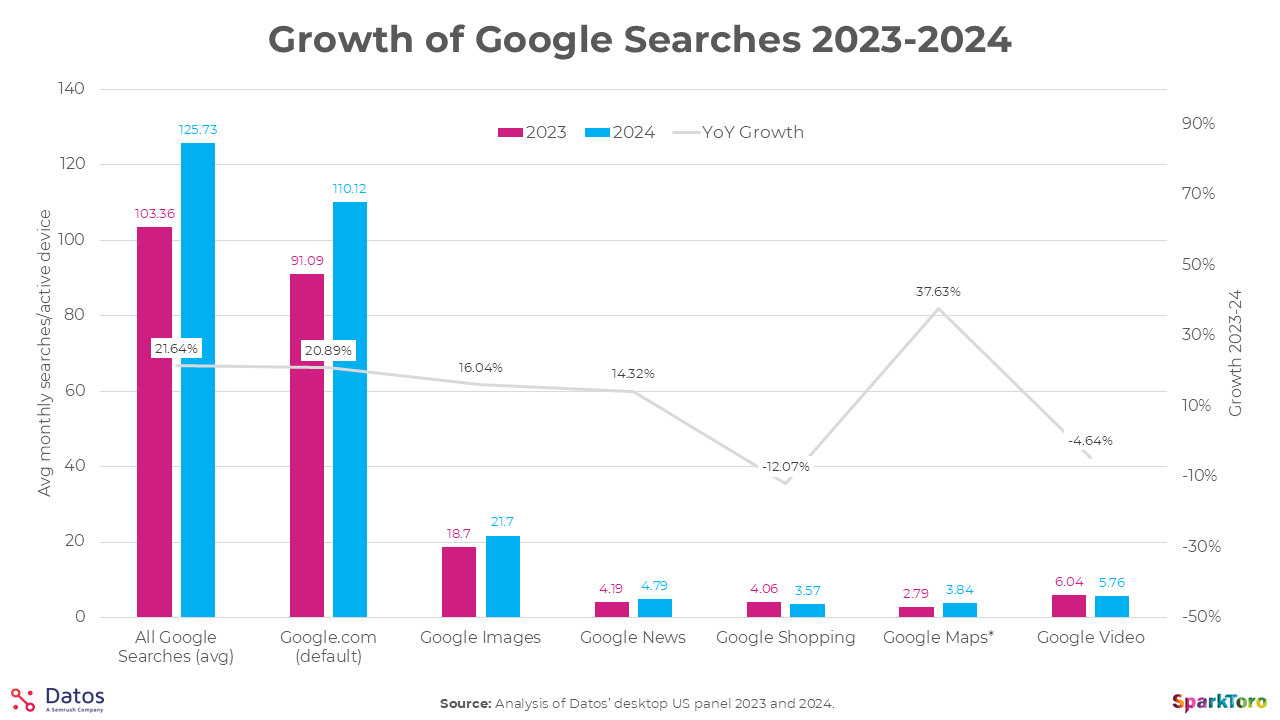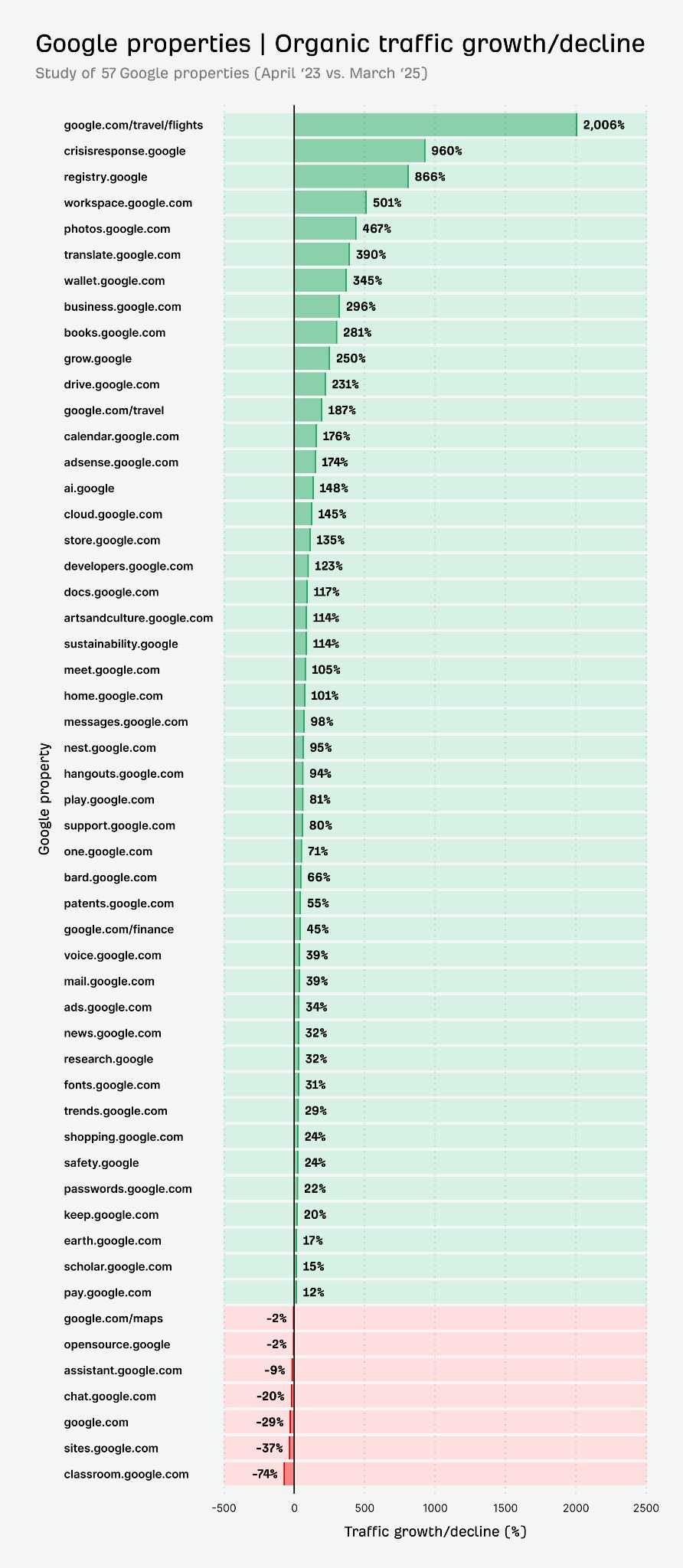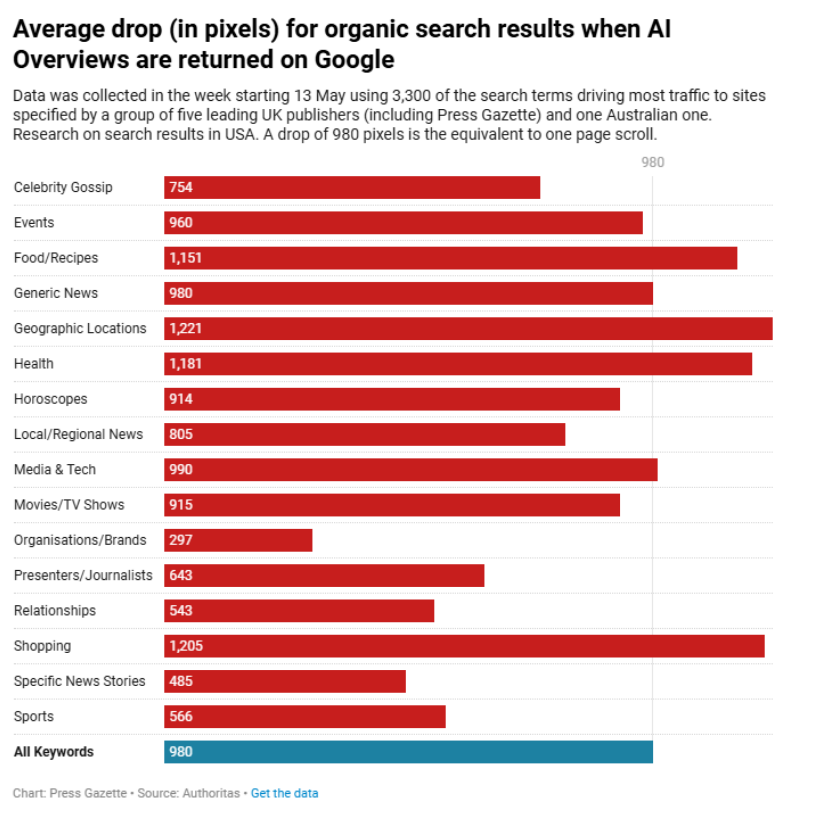AI, AIOs and the Future of Search for Publishers
A deep dive into whether everything is really is bad as it seems in Google-land and what you and I can do about it
TL;DR
Google Search is still growing: Despite narratives of decline, Google search volume is up nearly 22% year-over-year
Google’s market dominance holds firm, with around 94% of the global search market and continues to prioritise its own products, which have (also) seen a median organic growth of 94%.
AI Overviews are disrupting the SERP: AIOs now appear in over 18% of UK keyword results, with major impacts in categories like Health and Science - despite serious concerns about accuracy and trust.
CTR is plummeting: AIOs push organic links far down the page (sometimes over 1200 pixels), leading to CTR drops of up to 70% and contributing to a sharp rise in zero-click searches.
Is Google search really declining?
Certainly not according to Rand’s data. Searches in Google have grown by almost 22% YoY. It also fits with what their CEO said publicly about the introduction of AI Overviews increasing search usage in 2024:
“Based on our testing, we are encouraged that we are seeing an increase in search usage among people who use the new AI overviews as well as increased user satisfaction with the results.”
What about their market share?
Still, putting it mildly, strong with almost 94% of the search market. This does depend on which data you find more believable. Kevin Indig did identify that Google was losing somewhat significant market share in the EU, with Bing being the main beneficiary.
And their own properties?
Externally and internally, they’re still in pretty rude health. Ahref’s very good study into just how well Google looks after itself showed just brilliant Google thinks Google is;
50 Google properties have seen positive growth
Only 7 have seen negative growth
On average, Google’s properties have grown by 168% organically
Google’s median organic traffic growth came in at 94%
Numbers us lowly mortals who don’t know anything about creating products and services users like could only dream of.
Just look at how well Google Flights has done in recent times.
The product is ‘so good,’ in fact, that it has almost caught Skyscanner in a few measly years. Despite the fact that Skyscanner has three and a half times the branded traffic that Google Flights has.
This isn’t a great example of me insulting the search giant. Google Flights is a pretty good product. But still… Humour me.
Its unbranded traffic has, if you’ll excuse the pun, soared past Skyscanner. Extraordinarily, it’s almost double.
One does wonder just how poor the bottom seven properties must have done to see a decline. Maps, I think is the real anomaly. I suspect it has just completely maxed out its market share…
If you needed more convincing, Google was the top ranking site for some very health-specific terms like ‘how can I lose weight fast’ this year. It ranked with its frankly abysmal Google Store blog hawking its shitty pixel watch. The mind does indeed boggle.
As long as your product is owned and operated by Google, Reddit, or one of its very close subsidiaries there’s space in the market to grow.
What about AIOs?
In the UK, AI Overviews now appear for over 18 percent of the keywords according to Sistrix. In previous months, the figure was just 4 percent. These are increasing in prevalence around the world, particularly in more developed markets.
Spare a thought for the featured snippet when you can.
The King is dead. Long live the King.
It is important to note that this isn’t the case across every industry. We’ve run a substantial (ish) amount of internal research into the prevalence and impact of AIOs and found that some sectors had as much as 25% and others 0%.
This broadly aligns with Kevin Indig’s meta analysis, which found that Health, People & Society and Science were the most affected categories.
Health is an interesting one. You would think anyone with half a brain wouldn’t touch a sector with such damaging real world consequences as health with a shitty stick. Particularly a shitty stick prone to mad bouts of the hallucinogenic variety.
Like a teenager on their gap year licking a toad in the Amazon. Bloody. Banter.
Sitecurve’s excellent March 2025 update analysis suggested that health-related AIOs were decreasing in prevalence. So maybe their training data and deals with companies like Healthline and Pub Med were just a starter for ten.
Trustworthy sites with very detailed Knowledge Graph data undoubtedly present excellent training material. But if they encourage people to eat glue or blow their nose with razor blades, maybe they aren’t the answer.
What does this mean for CTR?
The follow up problem with AIOs is just how busy the average SERP is now. Traditional listings see a CTR reduction of up to 70% when an AIO is present. And not just because the query is answered more effectively on Google’s results page.
It’s because the traditional blue links are shifted significantly further down the page when an AIO is present. Over 1200 pixels in some cases.
And we now exist in a sphere where 60% of searches don’t end with a click. 60.
Zero click searches are already at an all time high and AIOs and AI mode are only going to exacerbate this. Now, this may be somewhat offset by the increasing number of searches Google has been experiencing over the last two years.
But I doubt it. If that was truly the case I suspect we’d get AIO tracking in GSC.
It’s not just AIOs and rich snippets you’re competing against. It’s Google’s own properties. The rented land we built our house on is eroding. But it’s still our best way of converting casual users into habitual subscribers.
AIOs linking to Google results pages
Since writing this, Google has officially rolled out links in AI Overviews to its own search results pages. This is designed to, and I quote, “help searchers explore more topics.”
It has nothing to do with keeping users on their own properties for longer. increasing the chance of a paid click and increased advertising revenue. None at all. How dare you even insinuate that idea.
Another nail in the coffin for AIOs having any real benefit to site owners and publishers, unfortunately. The rise in zero click searches and dwindling CTR looks set to continue. I suspect this won’t be limited to SERP results pages and will link to any and every Google-owned property under the sun.
GEO vs SEO guff
Aleyda has created a very good summary of GEO and SEO. Ditto Ryan Law at ahrefs. There are, or at least will be some subtle differences in maximising your presence in both. But none that matter at the moment.
Doing well in search will serve you well in LLMs. Traffic from LLMs will convert well, but for most sites will makeup a fraction of your total. So consider whether it’s really worth your time.
Building a strong brand that generates links and mentions are immensely valuable across both. Great content that is accessible to crawlers and users is still foundational. But there are some nuances to be aware of.
LLMs are trained on data not present in search (E.g. Github data)
Unlinked mentions matter more for LLMs. They increase the strength of a brand’s entity within the broader industry according to Gianluca Fiorelli
Right now they don’t render Javascript (although I’m sure that will change)
And according to Ryan at Ahrefs, LLMs show a “preference” for core website pages and documents, and a “dislike” for listing collections and listings
So what do we do?
Search is still a great channel. Don’t forget that. Particularly with the upcoming advent of Discover for desktop. But the channel imbalance is righting itself. Putting my unbiased hat on, we’ve had it too good for too long.
Now really is the time to learn how to create (and amplify) great content. Finally, how to gather customer data for your owned marketing channels. Rinse and repeat.
That’s our job. Create brilliant content that users can find at the right time in their journey.
Don’t, whatever you do, create shitty content because it’s easy. That a one way ticket to mediocrity. It’s easier than ever to be average. And that’s good news for quality content creators.
I’ll write a more detailed guide on content creation soon. As a starter for ten in SEO, I recommend becoming au fait with Google’s Quality Rater Guidelines. Luckily I’ve distilled their dismal looking near 200 page PDF into something jazzier.
Fundamentally, great content;
Stands out from the rest (in a good way)
Showcases uniqueness. Real expertise.
Flows. Is easy to consume in whatever format. Brings people back.
Generates buzz in the wider industry. People should talk about you and your brand.
And that’s not easy.
Three steps to success
Go viral. Be creative. Stand out. Build links. Generate mentions. The side of marketing we’ve kind of forgotten in SEO. Be clickable and memorable.
Get involved in the industry your are in. Foster a strong brand and encourage the building of personal brands within the company.
Take back control - gather customer data. Build your owned channels.
You have to stand out for the right reasons. As a publisher, if your content isn’t at least as good as your competition, why should anyone care?
















